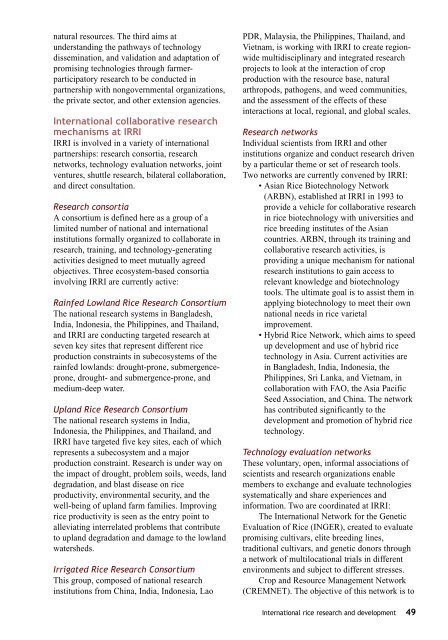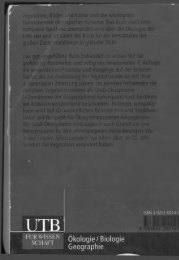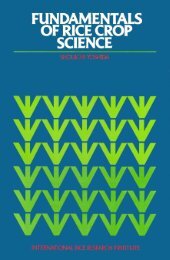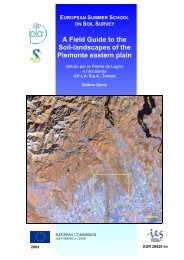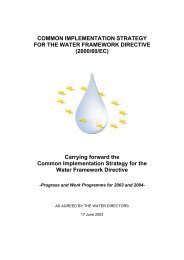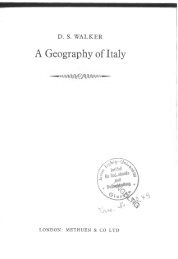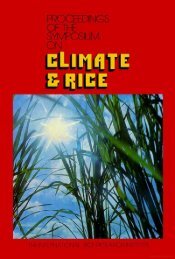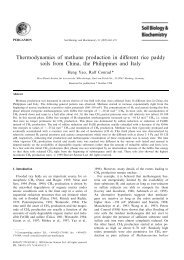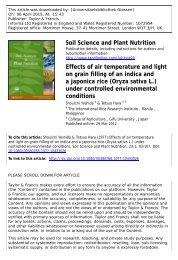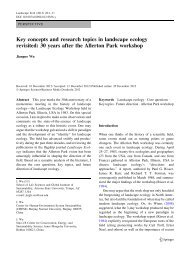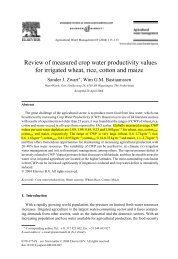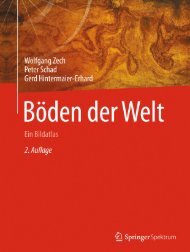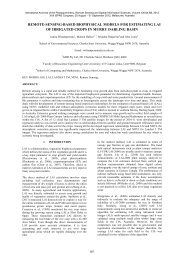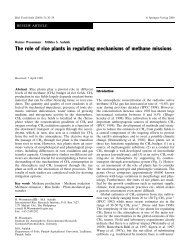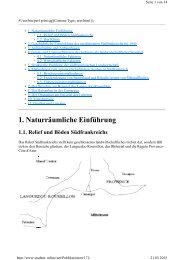Maclean et al. - 2002 - Rice almanac source book for the most important e
Maclean et al. - 2002 - Rice almanac source book for the most important e
Maclean et al. - 2002 - Rice almanac source book for the most important e
Create successful ePaper yourself
Turn your PDF publications into a flip-book with our unique Google optimized e-Paper software.
natur<strong>al</strong> re<strong>source</strong>s. The third aims at<br />
understanding <strong>the</strong> pathways of technology<br />
dissemination, and v<strong>al</strong>idation and adaptation of<br />
promising technologies through farmerparticipatory<br />
research to be conducted in<br />
partnership with nongovernment<strong>al</strong> organizations,<br />
<strong>the</strong> private sector, and o<strong>the</strong>r extension agencies.<br />
Internation<strong>al</strong> collaborative research<br />
mechanisms at IRRI<br />
IRRI is involved in a vari<strong>et</strong>y of internation<strong>al</strong><br />
partnerships: research consortia, research<br />
n<strong>et</strong>works, technology ev<strong>al</strong>uation n<strong>et</strong>works, joint<br />
ventures, shuttle research, bilater<strong>al</strong> collaboration,<br />
and direct consultation.<br />
Research consortia<br />
A consortium is defined here as a group of a<br />
limited number of nation<strong>al</strong> and internation<strong>al</strong><br />
institutions <strong>for</strong>m<strong>al</strong>ly organized to collaborate in<br />
research, training, and technology-generating<br />
activities designed to me<strong>et</strong> mutu<strong>al</strong>ly agreed<br />
objectives. Three ecosystem-based consortia<br />
involving IRRI are currently active:<br />
Rainfed Lowland <strong>Rice</strong> Research Consortium<br />
The nation<strong>al</strong> research systems in Bangladesh,<br />
India, Indonesia, <strong>the</strong> Philippines, and Thailand,<br />
and IRRI are conducting targ<strong>et</strong>ed research at<br />
seven key sites that represent different rice<br />
production constraints in subecosystems of <strong>the</strong><br />
rainfed lowlands: drought-prone, submergenceprone,<br />
drought- and submergence-prone, and<br />
medium-deep water.<br />
Upland <strong>Rice</strong> Research Consortium<br />
The nation<strong>al</strong> research systems in India,<br />
Indonesia, <strong>the</strong> Philippines, and Thailand, and<br />
IRRI have targ<strong>et</strong>ed five key sites, each of which<br />
represents a subecosystem and a major<br />
production constraint. Research is under way on<br />
<strong>the</strong> impact of drought, problem soils, weeds, land<br />
degradation, and blast disease on rice<br />
productivity, environment<strong>al</strong> security, and <strong>the</strong><br />
well-being of upland farm families. Improving<br />
rice productivity is seen as <strong>the</strong> entry point to<br />
<strong>al</strong>leviating interrelated problems that contribute<br />
to upland degradation and damage to <strong>the</strong> lowland<br />
watersheds.<br />
Irrigated <strong>Rice</strong> Research Consortium<br />
This group, composed of nation<strong>al</strong> research<br />
institutions from China, India, Indonesia, Lao<br />
PDR, M<strong>al</strong>aysia, <strong>the</strong> Philippines, Thailand, and<br />
Vi<strong>et</strong>nam, is working with IRRI to create regionwide<br />
multidisciplinary and integrated research<br />
projects to look at <strong>the</strong> interaction of crop<br />
production with <strong>the</strong> re<strong>source</strong> base, natur<strong>al</strong><br />
arthropods, pathogens, and weed communities,<br />
and <strong>the</strong> assessment of <strong>the</strong> effects of <strong>the</strong>se<br />
interactions at loc<strong>al</strong>, region<strong>al</strong>, and glob<strong>al</strong> sc<strong>al</strong>es.<br />
Research n<strong>et</strong>works<br />
Individu<strong>al</strong> scientists from IRRI and o<strong>the</strong>r<br />
institutions organize and conduct research driven<br />
by a particular <strong>the</strong>me or s<strong>et</strong> of research tools.<br />
Two n<strong>et</strong>works are currently convened by IRRI:<br />
• Asian <strong>Rice</strong> Biotechnology N<strong>et</strong>work<br />
(ARBN), established at IRRI in 1993 to<br />
provide a vehicle <strong>for</strong> collaborative research<br />
in rice biotechnology with universities and<br />
rice breeding institutes of <strong>the</strong> Asian<br />
countries. ARBN, through its training and<br />
collaborative research activities, is<br />
providing a unique mechanism <strong>for</strong> nation<strong>al</strong><br />
research institutions to gain access to<br />
relevant knowledge and biotechnology<br />
tools. The ultimate go<strong>al</strong> is to assist <strong>the</strong>m in<br />
applying biotechnology to me<strong>et</strong> <strong>the</strong>ir own<br />
nation<strong>al</strong> needs in rice vari<strong>et</strong><strong>al</strong><br />
improvement.<br />
• Hybrid <strong>Rice</strong> N<strong>et</strong>work, which aims to speed<br />
up development and use of hybrid rice<br />
technology in Asia. Current activities are<br />
in Bangladesh, India, Indonesia, <strong>the</strong><br />
Philippines, Sri Lanka, and Vi<strong>et</strong>nam, in<br />
collaboration with FAO, <strong>the</strong> Asia Pacific<br />
Seed Association, and China. The n<strong>et</strong>work<br />
has contributed significantly to <strong>the</strong><br />
development and promotion of hybrid rice<br />
technology.<br />
Technology ev<strong>al</strong>uation n<strong>et</strong>works<br />
These voluntary, open, in<strong>for</strong>m<strong>al</strong> associations of<br />
scientists and research organizations enable<br />
members to exchange and ev<strong>al</strong>uate technologies<br />
systematic<strong>al</strong>ly and share experiences and<br />
in<strong>for</strong>mation. Two are coordinated at IRRI:<br />
The Internation<strong>al</strong> N<strong>et</strong>work <strong>for</strong> <strong>the</strong> Gen<strong>et</strong>ic<br />
Ev<strong>al</strong>uation of <strong>Rice</strong> (INGER), created to ev<strong>al</strong>uate<br />
promising cultivars, elite breeding lines,<br />
tradition<strong>al</strong> cultivars, and gen<strong>et</strong>ic donors through<br />
a n<strong>et</strong>work of multilocation<strong>al</strong> tri<strong>al</strong>s in different<br />
environments and subject to different stresses.<br />
Crop and Re<strong>source</strong> Management N<strong>et</strong>work<br />
(CREMNET). The objective of this n<strong>et</strong>work is to<br />
Internation<strong>al</strong> rice research and development 49


